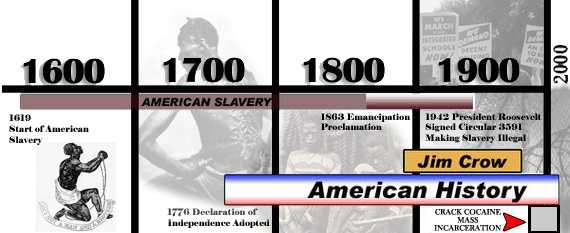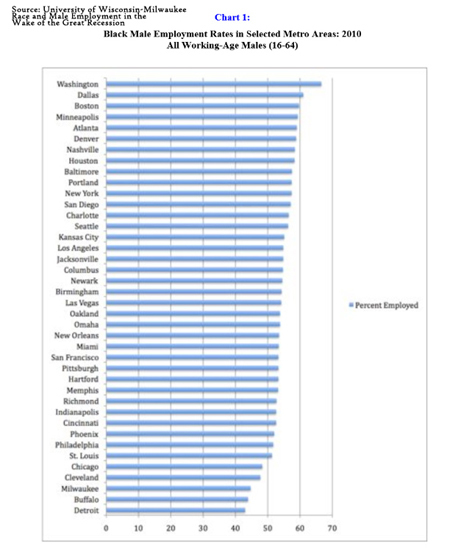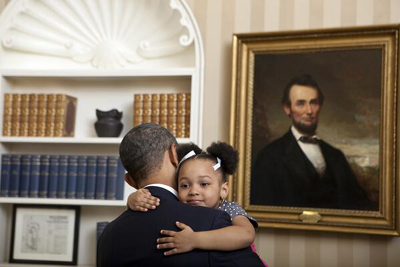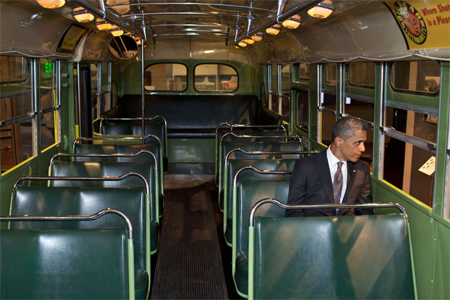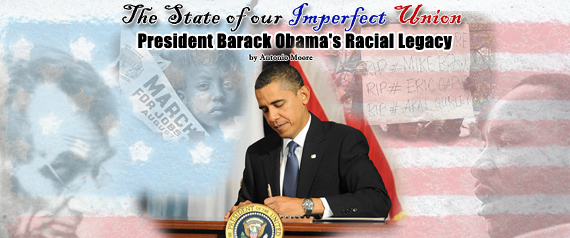
On election night November 4th, 2008, when Barack Obama walked out to accept the presidency with his wife and young daughters by his side, his every step forward seemed to represent a leap of racial progress by the United States.
As he took the oath at the beginning of 2009, his inauguration represented the hope that a corner had been turned regarding race in America. Between the Cosby show being broadcast into homes across the country as the ideal version of the all American family, Jay-Z and Beyonce's ascension to the global image of the U.S. celebrity power couple, and Oprah's meteoric self-made rise signifying a lifting of the black economic position overall. There was a feeling a "Change We Can Believe In" was in the air. It appeared America was poised to advance past its racial history, into a bright new post-racial future.
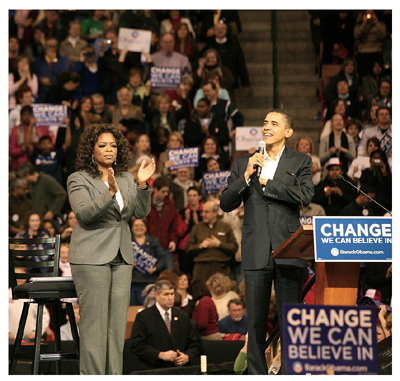
President Obama was the visualization of this next post-racial stride, born of white and black parents, educated at Harvard, and representing a form of black leader that was more centered as a general election politician. His very presence was the archetype of an ideal for our country's next phase on race. A natural step past our historical ills, and a way to move beyond slavery, despite the fact black Americans still had not even received a formal apology for the institution's lasting effects.
As we enter the last leg of President Obama's second term, and he molds the final parts of his racial legacy with a recent announcement of plans to attack housing segregation. We can now begin to look back and question the actions he has made, evaluating the effects of his policy choices on closing the massive opportunity gap that exist between blacks and whites in America.
Many have criticized him regarding what they perceive as his administration's inaction on racial issues. As stated in the Washington Post piece, "Obama tried to outsource his racial legacy" by Paul Butler
The African Americans who danced in the streets of Harlem when Obama was first elected did not expect that the president would, in four or eight years, reverse centuries of entrenched subjugation. But they did assume he would make racial justice a significant part of his platform. They were sadly mistaken.
It is undeniable that his presence has represented a movement in America's political mindset. A country that only 50 years prior had held black Americans in the status of second class citizens, has now voted a black man into the highest office in the land. President Obama won with the vote of a broad base of supporters across a vast array of ethnic and socioeconomic lines. Yet, it cannot be understated that the delivery of the African American vote with unparalleled turnout was a key to his election wins. His election was believed by many to be the mark of the achievement of Dr. Martin Luther King Jr.'s dream of equality. President Obama served as an indicator that we as a nation could finally look beyond color, and elect on more than appearance, and ethnic origin.
In the initial analysis of President Obama's heritage, most discourse looked closely at his mother's lineage. As the critiques of the president came, they mainly focused on his white ancestry when questioning his American blackness. In that debate a discussion about race versus ethnicity, and President Obama's true place in our nation's racial history was lost in the fray. Just recently in a powerful New York Times piece entitled "Apologize for Slavery" author Timothy Egan noted
As the son of a Kenyan father and a white mother who died more than a century after slavery ended, Barack Obama has little ancestral baggage on this issue. Yet no man could make a stronger statement about America's original sin than the first African-American president.
To truly appreciate President Obama's racial legacy, you must understand the history of the terms that have been used to describe blacks in America. In an NBCNews.com piece evaluating how we progressed toward using the term African American it was explained:
In Latin, a forerunner of the English language, the color black is "niger." In 1619, the first African captives in America were described as "negars," which became the epithet still used by some today. The Spanish word "negro" means black. That was the label applied by white Americans for centuries. The word black also was given many pejorative connotations -- a black mood, a blackened reputation, a black heart. "Colored" seemed better, until the civil rights movement insisted on Negro, with a capital N. Then, in the 1960s, "black" came back -- as an expression of pride, a strategy to defy oppression. "Every time black had been mentioned since slavery, it was bad," says Mary Frances Berry, a University of Pennsylvania history professor and former chair of the U.S. Commission on Civil Rights. Reclaiming the word "was a grass-roots move, and it was oppositional. It was like, 'In your face.'" Afro-American was briefly in vogue in the 1970s, and lingers today in the names of some newspapers and university departments. But it was soon overshadowed by African-American, which first sprouted among the black intelligentsia. The Rev. Jesse Jackson is widely credited with taking African-American mainstream in 1988, before his second presidential run.
When African American was coined in the late eighties, it was a sort of cultural safe haven for the lost that came out of a legacy of American slavery. A place for the progeny of the enslaved to call their own, no matter if the classification referenced an entire continent, and not a specific country. President Obama being part Kenyan American brought the discussion of the expansion of American blackness beyond the descendants of the enslaved to the forefront. He cannot be evaluated on issues of race without an understanding of this important nuance.
In 2004 the New York Times piece "African American as a Term for Debate" delved deeper into the classification African American showing the importance of the difference between those blacks that were from a legacy of enslavement and other groups, and the consequence of ignoring the existence of the division.
In the 1990's, the number of blacks with recent roots in sub-Saharan Africa nearly tripled while the number of blacks with origins in the Caribbean grew by more than 60 percent, according to demographers at the State University of New York at Albany. By 2000, foreign-born blacks constituted 30 percent of the blacks in New York City, 28 percent of the blacks in Boston and about a quarter here in Montgomery County, Md., an analysis of census data conducted at Queens College shows. In recent years, black immigrants and their children have become more visible in universities, the workplace and in politics, with Colin L. Powell, the son of Jamaican immigrants, serving as secretary of state, and Barack Obama, born to a Kenyan father and an American mother, leading the polls in the race for a United States Senate seat in Illinois and emerging as a rising star in the Democratic Party... Many argued that the term African-American should refer to the descendents of slaves brought to the United States centuries ago, not to newcomers who have not inherited the legacy of bondage, segregation and legal discrimination.
Political capital is limited, even when an administration starts with as much as President Obama's did in 2009. Was Barack Obama to be a president concerned with the opening of new dialogue with the countries of the Arab and Muslim world, or a president that dealt with the large number of murders that were occurring in black communities on the South Side of Chicago? These differences of ethnicity and race remain an unresolved question in our country's diverse American fabric. They also have been a major part of President Obama's story, as the country tried to define him as a black man in America.
Despite the election of President Obama, racism and its remnants have loomed large. It can be questioned whether the singular moment that a black man was elected finally again made America confront its historical reflection? Atlantic.com's Ta-Nehisi Coates in his piece "Fear of a Black President" had this to say on the topic:
"The thing is, a black man can't be president in America, given the racial aversion and history that's still out there," Cornell Belcher, a pollster for Obama, told the journalist Gwen Ifill after the 2008 election. "However, an extraordinary, gifted, and talented young man who happens to be black can be president."
Belcher's formulation grants the power of anti-black racism, and proposes to defeat it by not acknowledging it. His is the perfect statement of the Obama era, a time marked by a revolution that must never announce itself, by a democracy that must never acknowledge the weight of race, even while being shaped by it. Barack Obama governs a nation enlightened enough to send an African American to the White House, but not enlightened enough to accept a black man as its president.
The problem remains, that racism and its vestiges have endured. In spite of how the president's rise individually represented a change in racial views, African Americans as a group faltered significantly over his two terms. From home ownership, unemployment, to mass incarceration, the numbers have been bleak for African American families across the nation. Due to the enormous advantages, which were created specifically from the multi-generational subjugation of blacks, achieving a change we can believe in has not come easy.
Generally focused policy has done little to fix the problem of racial disadvantages created by entrenched racial oppression. This remains the case in 2015, just as it was in 1965, and 1865 before. The Charleston shooting, Baltimore riots and Ferguson unrest serve as reminders that this is the case.
Historically, dating back to slavery, black America was not only excluded economically, but black bodies were the coin that created much of America's economic advantage. Racial discussions by the President's administration in large part have failed to move beyond symbols such as the Confederate flag, and into policy.
You cannot evaluate the racial legacy of President Obama, without an evaluation of the general state of black America during his two terms. Despite having a black president in office, today well over half of all black American families live in a state of constant financial instability. They exist with little to no savings as a direct result of long standing policies. According to the Slate.com article, "The Wealth Gap Between Blacks and Whites Is Even More Enormous Than You Think",
The median black family, minus cars and the like, is worth just $1,700 (40 percent have zero or negative wealth). The median white family is worth, roughly, 69 times more.
This means, of the nearly 15 million black homes across our nation, 7.5 million of these families have a total net worth of less than $1,700.00 when you deduct the family car. Times are truly dire, major studies have signaled its even worse for single black mothers. The report entitled, "Lifting as We Climb: Women of Color, Wealth and America's Future", calculated that the median net worth for a single black mother in America is only 5 dollars. According to studies done by the University of Wisconsin-Milwaukee, working age black males in major cities across the nation have real unemployment rates above 50 percent.
In sum, African Americans fell further behind over the last ten years. Banks are lending to blacks for home loans at the lowest rates since 1999, black young men are going to prison at record high rates for "poverty crimes", and without government intervention forcing banks to do business with black Americans, commercial prospects will be abysmal for black communities going forward.
Just recently the President recognized we must look deeper stating
Racism, we are not cured of it, ... And it's not just a matter of it not being polite to say ni**er in public. That's not the measure of whether racism still exists or not. It's not just a matter of overt discrimination. Societies don't, overnight, completely erase everything that happened 200 to 300 years prior.
Much must be answered for by the Obama administration. The creation of "My Brothers Keeper" to help minority young men is commendable, but it is a far cry from funded legislation that leads to change. According to Judith Fenlon the business editor for the Chronicle of Social Change,
It does not appear that the federal government will bring any resources to bear for My Brother's Keeper; Obama did not announce... Federal funding for it, nor did he single any out in his fiscal 2015 budget request.
Without focused policy dealing with the state of abject poverty so many black youth like Freddie Gray and Mike Brown grow up within, things will get worse. Unrest in Baltimore is a precursor to a national racial crisis. The policies start at the national level with the President's pen, but come down to the local level and onto all of our kitchen tables.
For much of his first term, President Obama did little to address race. As such, it festered under what I have termed the "Decadent Veil". Referencing an over-representation of the black economic progress of a few black Americans, this veil has been presented throughout media channels.
With the death of Trayvon Martin, for one the first times in his Presidency, Obama was forced to confront race head on. Not as a politician, but as a black man. He did so, delivering words on race, which reminded us of Lyndon B. Johnson, or Abraham Lincoln before him. As I stated then, I believe when President Obama spoke on Trayvon Martin's death he echoed screams that went back generations.
President Barack Obama in 20 minutes delivered on Martin Luther King's dream of social justice in action. He gave a voice to the voiceless, speaking for Trayvon Martin, Medgar Evers and many other nameless African-Americans in U.S. history. The President gave a voice to slaves that lost their live's running away in the deep south in the 1800's, people lynched for their views in the Jim Crow 1950's and men chained to long sentences for nonviolent offenses in prisons across the United States today.
This moment moved him beyond the "beer summit" with Henry Gates at the White House, or a partial response to the issues of black farmers demanding fair treatment when applying for Agriculture Department loans. Trayvon Martin's death had a heartbeat that echoed of Emmett Till. It forced the President to look in the mirror and deliver the iconic line that reminded us all of his awareness of his blackness, no matter how white the house he lived in was painted.
"Trayvon Martin could have been me 35 years ago... There are very few African-American men in this country who haven't had the experience of being followed when they were shopping in a department store. That includes me." President Barack Obama
Yet, after this historic moment little policy to address the problem followed. The "My Brothers Keeper" program as aforementioned had no government funding attached, and as a result a far too limited scope. From Jordan Davis, to Mike Brown and Eric Garner that followed, the issues of race as they unfolded came to be resolved by reactionary responses from the Obama administration. It was as if the administration believed that each death of a young black male was an isolated instance, rather than the resulting consequence of a racial legacy. A legacy of covenants and redlining, a racial past marked with both slave shackles and prison handcuffs. With the death of Freddie Gray this all erupted as a community of youth in Baltimore reacted on their own to a lack of answers, with an energy sparingly seen since the riots of the 1960's.
While overarching policies such as a push toward universal health care, and changes in wage laws have occurred, and it is undeniable these laws help African Americans as they lift all boats. These are not the type of policies that make for a landscape changing racial legacy of a President. President Barack Obama's recent announcement of plans to attack long-standing segregation may be the type of action that leaves his final mark on America's divided racial roots.
Racial progress in America emanating from the oval office undoubtedly is framed though the eras of President Abraham Lincoln's "Emancipation Proclamation" calling for the end of American Slavery, and President Lyndon B. Johnson and his historical work with Dr. Martin Luther King Jr. on Civil Rights. To this point, President Barack Obama has not had a defining moment or proposed policy that pushed black America forward as these actions did in their respective times. While he did change sentencing for cocaine by signing the Fair Sentencing Act, closing the disparity between how crack and cocaine were sentenced (which we covered extensively in the Al Jazeera documentary I served as a producer on, "Freeway: Crack In the System"), much of the application was not retroactive, and in addition, the new law did little to resolve the resulting damage the sentencing disparities already had on African American families.
President Obama's aforementioned plans to push forward the integration of parts of America long divided along color lines may be the moment his racial legacy reaches further. As stated by the Washington Post
the Obama administration will announce long-awaited rules designed to repair the law's unfulfilled promise and promote the kind of racially integrated neighborhoods that have long eluded deeply segregated cities like Chicago and Baltimore. The new rules, a top demand of civil-rights groups, will require cities and towns all over the country to scrutinize their housing patterns for racial bias and to publicly report, every three to five years, the results. Communities will also have to set goals, which will be tracked over time, for how they will further reduce segregation.
So here he sits, occupying the same seat that Rosa Parks took to push our nation forward over fifty years ago. The question remains how will his impact on African Americans be remembered? President Barack Obama undoubtedly serves as a marker of a brewing change in our country's outlook on race. But as Rosa Parks said so many years ago "Racism is still with us. But it is up to us to prepare our children for what they have to meet, and, hopefully, we shall overcome." The irony being that as she sat in the aforementioned bus seat on December 1, 1955, President Barack Obama was that yet to be born child she spoke of in the prior statement.
As we celebrate the progress we have made in electing our nation's first black president, and look back to his legacy we must do so with context. President Obama is not the mark of the end of the dark days American racism's shadow has cast. His is a racial legacy undoubtedly entwined with his presence in a way that no President before him has been, and likely for a long while no president's will be.
Antonio Moore is a former prosecutor in Los Angeles. He is also one of the producers of the documentary on the Iran Contra & Crack Cocaine Epidemic"Freeway: Crack in the System presented by Al Jazeera." Mr. Moore has contributed pieces to theGrio, Eurweb and Huffington Post on the topics of race, mass incarceration, and economics.

